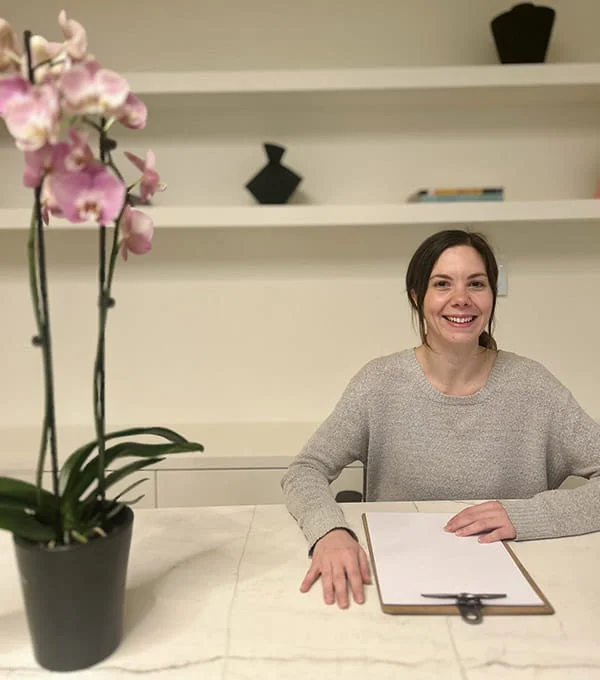Στην πορεία της ζωής μας βρισκόμαστε μπροστά σε πολύπλοκα σταυροδρόμια…
Frosso Foteinaki
Psychologist & Psychodynamic Psychotherapist
I completed my Bachelor studies in Psychology at the University of Panteion and my postgraduate studies at the University of Edinburgh. During my postgraduate studies, I specialized in Counseling and Psychotherapy. I graduated from my postgraduate studies as well as my psychotherapy training with honors. My supervised clinical training involved a combination of psychodynamic and person centered theory models and practices.
Following the completion of my clinical training, I worked for three years at the «Couple Counselling Lothian» of Edinburgh with individuals and couples that experienced difficulties within their family systems and relationships. With my return to Greece, I collaborated with the Institute of Mental and Sexual health of Dr. Thanos Askitis, where I trained on the diagnosis and therapy of sexual dysfunctions. My work included face to face therapy sessions with teenagers, adults and couples as well as over the phone counselling support via the Institute’s text line for sexual health.
I have been a member of the main research group of the University Research Institute of Mental Health, EPIPSY of Athens. EPIPSY in collaboration with the first Psychiatric Department of Aiginitio Hospital executed a panhellenic epidemiology research focusing on gambling addictions within adolescent and adult populations. The research protocol involved the analysis of personality characteristics as well as behavioral characteristics of the participants.
Additionally, I have been a main member of the scientific group of the Hellenic Centre for Diseases Control and Prevention of Greece, which significantly contributed in the development of a digital platform for the distribution of material focusing on the promotion of mental, physical and sexual health within the school communities.

Over the last ten years, I practice psychotherapy privately at my own psychotherapy center. In collaboration with the scientific group of the office, we provide counselling and psychotherapy services to children, adults, couples and families. Each therapy request is carefully processed by me in order to achieve the most suitable matching between therapists and clients.
My clinical experience involves trauma related difficulties, anxiety disorders, low self-esteem issues, relational difficulties, emotional enhancement and self development with a focus on self-love and self-care.
I am a certified trainer and coordinator of the Parent’s Effectiveness Training method by Gordon Training International. I organize and coordinate a series of masterclasses for parents, where the main goal is the empowerment of the participants within their parental role. Additionally, we organize workshops for teenagers with a variety of topics that are relevant to teenagers, such workshops for as social skills, sexual education, self-respect and self-confidence. Finally, we also offer trauma masterclasses for adults as well as group therapy sessions for adults.
My therapy work derives from psychodynamic theories however I incorporate in my work techniques and tools from Cognitive Behavioral Therapy, following a more synthetic model. Additionally, I am committed to work in accordance with the current Ethical Framework for Counselling Professions, as set by BACP. Finally, I am receiving continuous supervision on my work by the Professor of Psychology, Dr. Vivi Sotiropoulou.

Marina Vergopoulou
Psychologist & Systemic Psychotherapist
I have graduated with honors from the Psychology Department of the Aristotle University of Thessaloniki, and I have specialized in systemic psychotherapy. In brief, systemic therapy focuses on interpersonal relationships and the roles that each client adopts within these relationships. The resolution of difficulties occurs throughγ the exploration and alteration of the relational patterns of the client. This implies that each psychological challenge is approached comprehensively, often necessitating – in agreement with the client – sessions that involve individuals who play a key role in his/her life. Clients work collaboratively with the therapist on their personal difficulties, as one of the fundamental goals in systemic therapy is to help clients become active agents in their lives.
With a decade of experience in various mental health and social support institutions in Greece and abroad, I possess extensive knowledge in a range of social and psychological issues, such as professional challenges, unemployment challenges, relationship difficulties, family conflicts, divorce, loss/grief, anxiety disorders, depression, trauma-related issues, lifelong illnesses, childhood and adolescent issues, identity crises, existential anxiety/loss of meaning in life, self-awareness, self-development, career transitions, and other life changes.
My most recent professional experience as a systemic psychotherapist took place in the public healthcare system of the UK – an experience that shaped my identity as a therapist. It is important to mention that I am fully licensed to work in Greece and that besides Greek, I am also fluent in English.
In the context of my ongoing professional development, I have attended a series of postgraduate training programs in Greece and abroad. Some of these included the following specializations: Clinical Psychopathology, CAMHS – Child and Adolescent Mental Health Services, Trauma Management Support and Therapy, and the Family Group Conferencing method. My upcoming trainings involve the Compassionate Inquiry method by Dr. Gabor Mate, as well as the neurobiology of attachment program by the National Institute for the Clinical Application of Behavioral Medicine.
Driven by my unwavering commitment to addressing the needs of my clients comprehensively and effectively, I receive ongoing supervision for my services.
Services we offer:
One to one therapy for adults
Our life path involves several cross paths- big decisions, important changes, stressful events, difficult emotions, existential crises and many more pivotal points-during which we have the tendency to unconsciously hinder our development and happiness.
The most common question that I encounter during therapy sessions is ‘’how does this exactly work?’’. It is indeed very useful for people to understand the way therapy progressively works in order to feel safe within this process.
Firstly, the therapeutic journey encourages the development of a bounded relationship between the therapist and the client. This relationship on its own is a vehicle for change because it mirrors the way the client relates to other people. Additionally, the therapeutic relationship becomes a healing canvas due to the specifics of its structure: it is a relationship of emotional safety, trust and acceptance with the ultimate goal being the independence of the client, the encouragement of his/her autonomy outside the therapeutic union.

Within the therapeutic alliance, clients have the space and time to explore themselves, their past and present, their thoughts and emotions in order to identify which behaviors or relational patterns do not lead to their desired outcomes. The narration of their life story, their own personal story, gives birth to realizations that illuminate life decisions as well as their overall attitude towards life, allowing for changes, improvements and healing.
Therapists ought to offer their thoughts and connections in order to encourage the self discovery of the clients and in order to help them to come in touch with their actual needs.
In other words, the therapeutic journey offers the space for gradual change which involves the cultivation of self-awareness and confidence, the revelation of unprocessed needs as well as the discovery of strengths and personal qualities that can cultivate a life approach which is more in touch with the chient’s desires.

Couple therapy
Romantic relationships are relationships characterized by high complexity, since two strangers with different upbringings and experiences try to form a union while they go through their own personal changes over time, develop different sets of needs and follow multiple life roles – often contradictory to each other. Naturally, maintaining their emotional and sexual connection while trying to cultivate a healthy relationship with their own self, becomes one of the most difficult relational goals in life.
At the office, I often encounter individuals that feel that their relationship is going through a massive crisis, that their emotional needs are not being met or were never actually met. Sexual issues as well as dynamics resembling more those seen between siblings, rather than partners, cause tremendous anxiety and fear to many couples.
Our clinical experience points out that the lack of communication is the most common issue that couples experience, which often manifests via emotional as well as sexual disconnection. Quite often, emotional or sexual infidelity becomes the reason for a couple to ask the of a specialist. Family obligations such as the upbringing of children as well as the involvement of the broader family within the relationship of the couple can lead to a variety of issues which become apparent within therapy.
However, it is important to mention that sometimes the request with which couples come to therapy is separation and more precisely the smooth transition towards separation. Exiting a relationship, which by default requires emotional investment, is a tremendous life chapter, and thus it is experienced quite often similarly to losing someone to death. Complex feelings of loss arise, and therefore the therapeutic process offers the space to experience these feelings, understand them and ultimately accept them. Sometimes, the therapeutic process might extend to family therapy taking into account the impact of the separation on the emotional development of the children with the goal being to ensure their psychological balance throughout this period of massive life changes.
Each partner that decides to work collaboratively on the relationship will have the opportunity to look back in time and identify relational patterns from childhood that he/she might still be replicating within their current family systems and overall relational systems. All of us quite often repeat the relational models our parents introduced to us within our own families. These replications sometimes extend to the way our parents brought us up. The therapeutic process offers the space for each partner to express feelings, desires and needs that were never expressed, as well as recognize their own mistakes throughout the process of the relationship.
The adequately trained therapist ensures that both partners will have the time to express their feelings with a neutral standpoint and, most importantly, without intervening in any decision regarding the future of the relationship or any important decisions in regard to it.
Sex therapy
Sexual health falls under the umbrella of mental health and underlines the desire of humans to connect within a romantic union, to experience arousal and maintain arousal, to experience orgasms and overall enjoyment within their sexual experiences. Men, as well as women, often encounter throughout their sexual life sexual problems that might create anxiety, fear, guilt, shame and thus lead to avoidance tendencies towards any sexual experience.
The most common sexual problems that men experience are:
- Erectile dysfunction
- Premature ejaculation
- Delayed or retrograde ejaculation
- Reduced sexual desire
- Compulsive masturbation
Similarly, women quite often experience:
- The absence of sexual desire
- The difficulty to reach orgasms
- Pain during sex
It is important to keep in mind that sexual dysfunctions are treatable as long as the individual and the couple decides to work on them. With the careful support and guidance of a sexual health specialist, a thorough examination of the problem is conducted in order to identify the causes of its emergence and in order to follow the right interventions for the the gradual minimization and elimination of the issue. My clinical experience underlines that sexual issues that are not communicated and are not addressed, progressively hinder thehappiness of the couple, create emotions of anger between the partners and an overall feeling of inadequacy.


Family therapy & Play therapy for children
It is of significant importance to perceive the symptoms that children very often develop, such as aggressivity, complex attachment behaviors, phobias, anxieties, school dismissiveness, compulsiveness and many more, as an awakening call for difficulties that the entire family system is experiencing. This is the primary reason why we often conduct our first meeting with the parents, in order to receive a thorough developmental history of the child, while we collect information for each parent’s personal profile as well information about their the relationship.
Depending on the specific needs of each family, the therapeutic setting might or might not include the child. In the former case, we focus on the empowerment of the parents as well as on providing them with tools for handling emerging crises throughout their parental journey.
Within the sessions that involve the child, as in every other therapeutic setting, we invest in the relationship between the therapist and the child. Children need emotional involvement, connection, honesty, safety, acceptance and trust in order to open up and feel heard. The goal of the therapeutic process is to help children identify, share and handle emotions and thoughts, cultivate their emotional resources, improve their communication skills and their relationships with others. Simultaneously, working with children requires seeing them on a weekly basis, as children are focused on the present moment and are characterized by a short term perception of time.
A therapist that works with children may use various creative ways to achieve the therapeutic goals besides talking, such as playing games, narrating stories, role playing and visual arts, depending on the child’s developmental phase, his/her unique idiosyncrasy and his/her specific needs. These tools help the child to relax, to feel safe, to connect with the therapist and to reveal his/her concerns.
Quite often, visual arts and playing games may reveal more information than words do and illuminate the child’s deeper emotions and thoughts. The therapist invites the child on a journey of self-expression and exploration by using tools that are familiar to children. At the end of this journey, the child will develop the self-confidence and resilience needed to handle the challenges of his/her every day life while obtaining useful communication skills as well as relational skills.
Therapy for adolescents
Adolescence is the most turbulent period of our lives due to the developmental and hormonal changes taking place during this period along with the first meaningful, deep esoteric exploration of the inner world which leads to a variety of existential questions in an effort to form an identity as well as to find meaning in life.
No other living being goes through such as radical change as humans do, during the period of adolescence. Adolescence is the transitional phase that prepares humans for adultery on multimple levels: biologically, sexually, psychologically and socially. Due to the hormonal and bodily changes of adolescence, teenagers experience increased emotional and sexual sensitivities. These drastic changes might cause many arguments within their families. It is of crucial importance to mention that teenagers have the tendency to challenge theirparental models while feeling that their family is unable to understand them.

The psychological standpoint of teenagers is characterized by a deep ambivalence. They fiercely fight for their independence, but at the same time they depend heavily upon their families. They need boundaries that are effectively set by the consistent parental presence which provides the need for safety and emotional security, while simultaneously curating a space for them to find their own identity and challenge theirparental models. Teenagers need someone with whom they will clash so that they are able to then overcome this conflict and transition to the next developmental stage. The teenager cannot bare to see his/her parents weak and unstable. He/she needs to experience them as strong and stable, as a network of safety during this turbulent period of his/her life.
Parents quite often reach out to me about an issue that their teenager is experiencing, wondering what might be happening within his/her esoteric world. If necessary- and with the permission of the teenager- I conduct sessions with the parents in order to explore what they perceive as problematic, but most importantly in order to explore the relationship dynamics that unfold between the parents and within the family system. Follow-ups to parents regarding the therapeutic progress of the teenager are conducted with respect to the principles of confidentiality, as set in the psychotherapeutic protocols of good practice.
The most common requests that we encounter regarding teenagers are:
- School anxiety
- Low school performance
- Phobias
- Family conflicts
- Sexual education
- Sexual orientation
- Eating disorders
- Tech/gaming addiction

Online therapy
Psychological support through video conferencing is a modern therapy practice that can prove to be extremely beneficial and effective for individuals who, due to geographical limitations, mobility issues, or even demanding professional obligations, are unable to attend in-person sessions.
As demonstrated by relevant studies and reviews (University of Bristol 2009, Canadian Medical Association Journal_Review 2015), online counseling and psychotherapy can be equally effective as face-to-face. In fact, a study at a university in Australia (University of South Australia, 2014) highlighted that it is possible to build a strong and effective therapeutic alliance through online sessions.
Our video conferencing sessions are guided by the same ethical principles that apply to face-to-face sessions, following the standards of the International Society for Mental Health Online.
If you feel that this service meets your needs at this point in your life, please feel free to contact me to schedule our initial introductory session.
Group therapy
Group therapy, is a powerful transition from theory to practice. While traditional therapy focuses on processing individual issues as the clients unfold personal stories and narratives of their past and present, group therapy offers participants a unique opportunity for experiential learning. In group settings, we have the opportunity to reflect upon our presence within groups. These reflections and observations are valuable therapeutic resources. In other words, the group stands as an invitation for self-observation, reflection, and connection.
Within group settings, members process issues relating to themselves and their interactions with others, both in real-time and on a symbolic level. It’s not just the stories we tell and the experiences we share within the group that matter but also our involvement in the experiences and life stories of other members. Therapy becomes this process of exposure and sharing that elicits change. The experiential journey of the therapeutic group becomes the canvas for the internal and external changes each member wishes to bring into their lives.

There are various forms of group therapy, including structured and non-structured groups. Structured groups have a clearly defined framework, such as grief management, while non-structured groups have a more flexible framework aiming vaguely at positive changes in life. Another distinction is between closed and open-ended groups. Members in closed groups are pre-determined before the group work starts, while open-ended groups allow for the inclusion of new members throughout the therapeutic process. All group therapy sessions, regardless of their type, have a pre-determined schedule (fixed dates/time).
Our therapy groups are suitable for adults with individual or group therapy experience who can commit to bi-weekly two-hour group sessions. Within the therapeutic process, each member can bring forth their concerns, expressing thoughts and feelings, while facilitators ensure a safe sharing environment founded on respect and acceptance. Issues addressed in group therapy sessions include self-esteem, social difficulties, trust, interpersonal relationships, identity, self-awareness, existential questions, loss, and general life challenges.
Participation in a therapeutic group is voluntary, and while active communication from all members is encouraged, the process respects each member’s unique idiosyncrasy and preferences. Confidentiality is fundamental, with members refraining from sharing information about other members outside the group. The therapeutic group isn’t a place for developing social or friendly relationships; instead, it serves as a healing space for the challenges of life, providing members with knowledge, tools, and self-esteem to pursue their goals outside the therapeutic setting.
The process of joining a therapeutic group involves personal meetings with the therapists in order to explore the individual’s psychological readiness and openness to this therapeutic experience. Following this, individuals are introduced to the group, committing to bi-weekly two-hour sessions. The therapists facilitating the group are experienced professionals specializing in group psychotherapy.
For further information regarding our services, you can email fotinaki.secretary@gmail.com or contact us at our center’s phone numbers (0030)6981015684 & (0030)2111845239.
Πώς μπορούμε να σας βοηθήσουμε;
Συμβουλευτική & Ψυχοθεραπεία
Online Συμβουλευτική & Ψυχοθεραπεία
Η ψυχολογική υποστήριξη μέσω βιντεοσυνομιλίας, αποτελεί…



